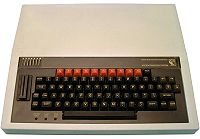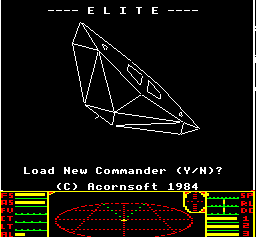Difference between revisions of "BBC Micro"
Cholmondely (talk | contribs) m (→Links) |
Cholmondely (talk | contribs) m (Links!) |
||
| Line 25: | Line 25: | ||
== Links == |
== Links == |
||
*Try it for yourself [https://bbc.godbolt.org/?disc=elite.ssd&autoboot=true here]! |
*Try it for yourself [https://bbc.godbolt.org/?disc=elite.ssd&autoboot=true here]! |
||
| + | *The Manual is [http://www.elitehomepage.org/manual.htm here]. |
||
[[Category:Factual]][[Category:Classic]] |
[[Category:Factual]][[Category:Classic]] |
||
Revision as of 01:57, 18 December 2020
The BBC Micro, affectionately known as the Beeb, was an early 8-bit home computer. It was designed and built by Acorn Computers Ltd for the British Broadcasting Corporation (BBC).
Its place in Elite history is assured by the fact that it was, along with the Acorn Electron, the machine for which Elite was first released, in 1984.
A special split-screen mode was used by Elite on the BBC Model B to save memory but allow some colours for the low resolution cockpit front panel.
Examples of the Cobra Mk. III spaceship performing a flyby of a Space Station at the planet Lave are available here:
1. Towards the Space Station with Lave out of view behind the ship. Lave_away.mov (warning 6 Mbytes)
2. Towards the Space Station with Lave visible beyond the Space Station. Lave_towards.mov (warning 15 Mbytes)
(BBC disk version of Elite run by the BeebEm3 emulator on a Mac)
Note how the ship's apparent speed is dependent on the rendering demands placed on the 8-bit 6502 processor.
A BBC Model B could be enhanced by a second parallel external processor, trade-marked as the TUBE. A TUBE-enhanced version of Elite was also released by Acornsoft. A comparable flyby runs approximately 20% faster, and more screen colours were available. Lave_tube.mov (warning 19 Mbytes)

